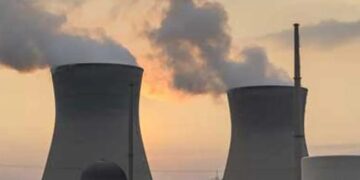The International Atomic Energy Agency (IAEA) has officially confirmed that there has been no radiation leak or release from any nuclear facility in Pakistan amid the recent military confrontation between India and Pakistan. This clarification comes in response to widespread speculation and claims circulating on social media, suggesting that Indian armed forces targeted Pakistan’s nuclear facilities during the course of Operation Sindoor.
A spokesperson for the IAEA stated, “Based on the information available to the IAEA, there has been no radiation leak or release from any nuclear facility in Pakistan.” The statement was issued to allay concerns regarding the potential for a nuclear incident in the region, emphasizing the agency’s commitment to monitoring nuclear safety and preventing the spread of misinformation.
The IAEA’s reassurance follows a media briefing by Air Marshal A.K. Bharti, Director General of Air Operations, who categorically denied reports that Indian forces had targeted Kirana Hills, a site known to house Pakistan’s nuclear installations. “We have not hit Kirana Hills, whatever is there,” Air Marshal Bharti clarified on May 12, directly refuting the claims of a nuclear strike.
The backdrop to these developments is India’s Operation Sindoor, launched in retaliation to the Pahalgam terror attack, which claimed 26 lives. The operation primarily targeted terrorist infrastructure and military installations in Pakistan. Despite India’s clarification that its strikes were confined to conventional targets, speculations regarding nuclear facilities persisted.
Reports surfaced suggesting that the Indian Air Force (IAF) had struck an airbase in Sargodha, with some media outlets speculating that the base might be linked to underground nuclear storage facilities in Kirana Hills. The IAF has consistently maintained that the focus of the strikes was to dismantle terror camps and limit the operational capabilities of terrorist networks, not to provoke a nuclear escalation.
Further dispelling misinformation, Randhir Jaiswal, Spokesperson for India’s External Affairs Ministry, addressed US President Donald Trump’s recent comments about averting a nuclear conflict between India and Pakistan. President Trump had asserted that US intervention played a pivotal role in preventing a potential nuclear confrontation between the two countries. Jaiswal, however, firmly dismissed such claims, stating, “India’s military action was in the conventional domain, and there was no consideration of a nuclear conflict.”
Trump’s remarks have been met with skepticism in New Delhi, particularly as India has consistently adhered to a no-first-use nuclear policy and has asserted that its military operations remain limited to counter-terrorism measures. “India’s actions are focused on defending its territorial integrity and national security within the framework of conventional warfare. There has been no deviation from this policy,” a senior defense official remarked.
While the Indian government has been proactive in countering the narrative of nuclear escalation, the international community has expressed concern over the implications of heightened military tensions in South Asia. The G7 group, in a joint statement, urged both India and Pakistan to exercise restraint and engage in dialogue to prevent further escalation. The statement acknowledged the Pahalgam attack but refrained from directly attributing responsibility to Pakistan, a move that has drawn criticism from Indian officials.
The specter of nuclear escalation in South Asia has long been a focal point of international diplomacy, given the history of military conflicts between India and Pakistan and their status as nuclear-armed states. The IAEA’s assertion of no radiation leak serves as a crucial countermeasure against misinformation and underscores the importance of factual reporting in times of conflict.
Analysts have noted that the circulation of false information regarding nuclear facilities can have severe repercussions, potentially triggering unwarranted panic and exacerbating geopolitical tensions. The IAEA’s timely intervention in clarifying the status of Pakistan’s nuclear facilities aims to prevent such consequences.
Moving forward, defense experts emphasize the need for both India and Pakistan to maintain open channels of communication to mitigate misunderstandings and to prevent the escalation of hostilities. They also recommend that international watchdogs like the IAEA continue to play an active role in verifying claims related to nuclear safety, thereby maintaining regional stability.
As the situation in South Asia continues to evolve, the IAEA’s confirmation that there is no radiation leak from any nuclear facility in Pakistan remains a critical development, reinforcing the agency’s role as a credible authority in nuclear safety and security worldwide.
Also Read : Mark Carney’s Tax Reliefs: How Will They Impact Indians Living in Canada?















 Categories
Categories









